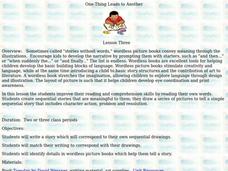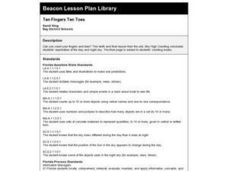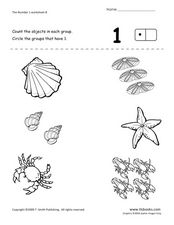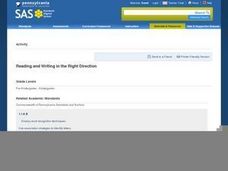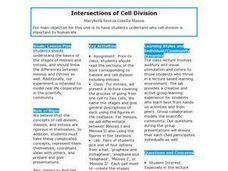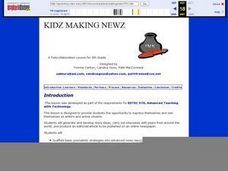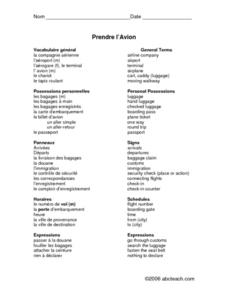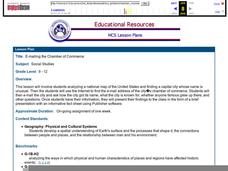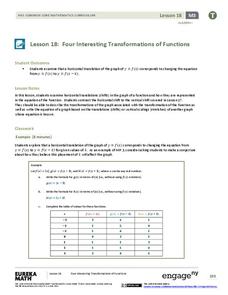Brooklyn Children’s Museum
Volcanoes!
Give young geologists an up close and personal look at volcanoes with a series of hands-on earth science lessons. Whether they are investigating the properties of igneous rocks, building their own volcanoes, or making fudge to model the...
EngageNY
Angle Sum of a Triangle
Prove the Angle Sum Theorem of a triangle using parallel line and transversal angle relationships. Pupils create a triangle from parallel lines and transversals. They find angle measures to show that the angles of a triangle must total...
Curated OER
One Thing Leads to Another
Students analyze the storytelling methods in wordless books. In this visual storytelling lesson plan, students write a story that correspond to a specific wordless picture book. Students create their own wordless picture book after...
Curated OER
Ten Fingers Ten Toes
First graders identify the number 10 by completing a page for a counting book. They add the page to the first nine pages.
T. Smith Publishing
The Number 1, 2, 3,, 4, 5 worksheets B
Five individual worksheets give preschoolers an opportunity to practice counting groups of animals up to the number five. Learners circle the group that has the correct number of animals as shown by a printed numeral and a domino with...
Curated OER
How Many Bears Book 1-10
In this counting workbook set, students make a mini counting book. They count the number of bear pictures on each page and color in the corresponding number circles that are shown on each page.
Curated OER
Make a Volcano Foldable
In this volcano worksheet, students make a "foldable" for the three types of volcanoes. They identify the volcano types, the type of lava, the type of eruption, the location of the volcano and the slope on one of three cards in the...
Curated OER
Test Your Vocabulary Skills: Word Pyramid 1
In this ESL word pyramid worksheet, students write words to correspond with the letters A through H. Each word must be one letter longer than the word prior to it, creating a pyramid of words.
Curated OER
Rate of Change 1
In this rate of change worksheet, pupils use functions to determine the velocity of an object. This two-page worksheet contains ten problems.
Curated OER
Reading and Writing in the Right Direction
Beginning writers practice writing and reading from left to right using green and red dots. You'll need notecards with a green dot on the left side and a red dot on the right side. Do your learners understand that print moves from left...
Curated OER
Introduction To Literary Analysis
Explore the fascinating ways in which authors use specific literary devices to create interesting and realistic texts. Using non-fiction articles with the subject of rogue waves, an excerpt from The Perfect Storm, by Sebastian Junger,...
Mathematics Vision Project
Geometric Figures
Logical thinking is at the forefront of this jam-packed lesson, with young mathematicians not only investigating geometric concepts but also how they "know what they know". Through each activity and worksheet, learners wrestle with...
National Endowment for the Humanities
Emulating Emily Dickinson: Poetry Writing
High schoolers analyze mood and voice in Emily Dickinson's poem, "There's a Certain Slant of Light." After the analysis, students write a poem of their own emulating the Dickinson poem, and then write a one-page essay describing what...
EngageNY
Complex Numbers and Transformations
Your learners combine their knowledge of real and imaginary numbers and matrices in an activity containing thirty lessons, two assessments (mid-module and end module), and their corresponding rubrics. Centered on complex numbers and...
Curated OER
Knowing Write from Wrong
Explore how the informality of electronic correspondence has affected communications in the workplace. Writers develop pages for a basic writing guide that contains rules and examples to help correct common writing errors. A great way to...
Curated OER
Intersections of Cell Division
Learners listen to a lecture covering the process of going from one cell to two cells. Using the textbook, students differentiate between meiosis I and Meiosis II. Learners work in pairs to create one stage using pipe cleaners, sequins,...
Curated OER
Treasure Tales
Create an artifact kit to engage your young learners. Then, assign small groups a section of chapter three. They will identify the main idea and three supporting details for their section. Then, they select one artifact from the kit that...
Florida Center for Reading Research
Phonics: Letter Recognition, Venn Diagram Letter Name Sort
What’s in a name? Letters, of course! Partners place the letters of their names on a Venn diagram. Letters they have in common are named and placed in the overlapping area of the circles, while letters unique to just one of the names are...
Curated OER
Kids Making News
Fifth graders correspond with one another regarding interesting global topics. They swap interview questions and collaborate in the publishing of an online newspaper. This should be a highly motivating lesson plan which get kids writing!
Curated OER
Prendre l'Avion
Do you want to travel to a French-speaking country? Then you need to know these vocabulary terms! The first page is the reference page, and it contains about 30 vocabulary terms and their definitions. After reviewing the terms, give each...
Curated OER
E-mailing the Chamber of Commerce
Encourage effective internet research and e-mail correspondence as scholars investigate a US capital city they've never visited to find pertinent and relevant information. They begin by picking a city, then visit that city's chamber of...
EngageNY
Four Interesting Transformations of Functions (Part 2)
What happens to a function whose graph is translated horizontally? Groups find out as they investigate the effects of addition and subtraction within a function. This nineteenth lesson in a 26-part series focuses on horizontal...
Curated OER
"Easter" Egg Genetics
Using plastic Easter eggs to represent parent phenotypes, genetics enthusiasts simulate the passing of alleles. They record the phenotype of each half of the egg, one representing the mother's and one representing the father's. They...
Florida Center for Reading Research
Phonics: Letter Recognition, Hungry Letter Mouse
Scholars take turns writing and identifying letters on a whiteboard. Learner one writes a letter; learner two finds it on the alphabet strip. If they are correct, Mr. Mouse gets to eat that letter, and if they are incorrect, Mr. Mouse...




